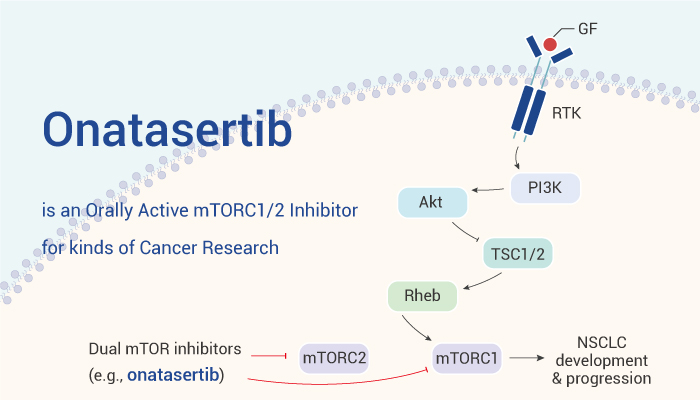mTOR is a serine/threonine kinase that regulates cell growth, metabolism, proliferation, and survival. In addition, mTOR complex-1 (mTORC1) and mTOR complex-2 (mTORC2) are critical mediators of the PI3K-AKT pathway, which is frequently mutated in many cancers, leading to hyperactivation of mTOR signaling. Importantly, PI3K pathway dysregulation ultimately leads to hyperactivation of mTOR signaling, making mTOR an attractive drug target. Although rapamycin analogues, allosteric inhibitors that target only the mTORC1 complex, have shown some clinical activity, mTOR kinase inhibitors, blocking both mTORC1 and mTORC2 signaling, will have expanded therapeutic potential. Hence, we will introduce an orally active mTORC1/2 inhibitor-Onatasertib (CC-223).
Onatasertib is a selective and orally bioavailable mTOR kinase inhibitor (IC50=16 nM).
In vitro, Onatasertib inhibits cell growth across a number of cancer cell lines, including cell lines insensitive to rapamycin treatment. Onatasertib potently inhibits cell growth across this cell panel, independent of the cell line’s rapamycin sensitivity, with IC50 values ranging from 92 to 1039 nM. In addition, Onatasertib (0-10 µM; 24 h) inhibits cell growth and induces apoptosis in a panel of hematologic cancer lines.
Onatasertib not only shows good activities in vitro, but also displays dose-dependent tumor growth inhibition in numerous solid tumor xenograft models. Onatasertib (10, 25 mg/kg; p.o.; single daily for 43 days) significantly inhibits PC-3 tumor growth in a dose- and schedule-dependent manner. Moreover, Onatasertib causes regression of the PC-3 tumors when dosed twice daily at 10 mg/kg, and the average tumor volume on day 43 was significantly (P < 0.01) smaller than the average starting volume at dosing initiation.
All in all, Onatasertib is a promising mTORC1/2 Inhibitor for kinds of cancer research.
Reference:
[1] Mortensen DS, et al. Mol Cancer Ther. 2015 Jun;14(6):1295-305.
